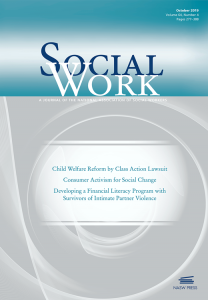 As the social work field increasingly recognizes economic abuse within intimate partner relationships, the field has developed financial empowerment programs to empower survivors for their financial future. Although research has demonstrated the effectiveness of financial literacy programs, there are barriers to their implementation in the field. Studies have explored, from the perspective of advocates, best practices in incorporating financial literacy into services; however, no studies have explored implementation approaches from the perspective of survivors.
As the social work field increasingly recognizes economic abuse within intimate partner relationships, the field has developed financial empowerment programs to empower survivors for their financial future. Although research has demonstrated the effectiveness of financial literacy programs, there are barriers to their implementation in the field. Studies have explored, from the perspective of advocates, best practices in incorporating financial literacy into services; however, no studies have explored implementation approaches from the perspective of survivors.
In a recent issue of the journal Social Work, published by NASW Press and Oxford University Press researchers published their findings on this topic. Their study explored, from the perspective of 34 survivors, approaches for implementing financial literacy programming. Participants described their understanding of financial empowerment as being in charge of finances, having financial power, and not having to endure the struggle. To counter financial disempowerment, participants identified the need for financial confidence, knowledge, and tools. Participants shared their strategies for saving money, though many participants reported barriers to using banks as savings tools. Almost all participants stressed the importance of financial literacy services for survivors, especially around banking, credit, and debt. Finally, participants shared recommendations for job readiness and training programming.
The findings of this study have implications for domestic violence and broader social work organizations implementing financial empowerment services. Social workers can support financial empowerment efforts through program development and research efforts.
Study authors:
Amanda M. Stylianou, PhD, LCSW, is the director of quality improvement, Rutgers University Behavioral Health Care, 151 Centennial Avenue, Piscataway, NJ 08854, e-mail: amanda.stylianou@rutgers.edu.
Elisabeth Counselman-Carpenter, PhD, LCSW, is assistant professor, Department of Social Work, Lang House, Southern Connecticut State University, New Haven, CT.
Alex Redcay, PhD, LCSW, is assistant professor, School of Social Work, Millersville University, Millersville, PA. The authors express their gratitude to Raquel Pittman, manager of strategic planning at Safe Horizon, for her support on this project and her passion for financial empowerment.
***
The journal Social Work is a benefit of NASW membership. It is available online or, at a member’s request, in print. Children & Schools, Health & Social Work and Social Work Research are available by subscription at a discounted rate for NASW members, either online or in print. You can find out more about the journals and subscriptions at NASW Press.



